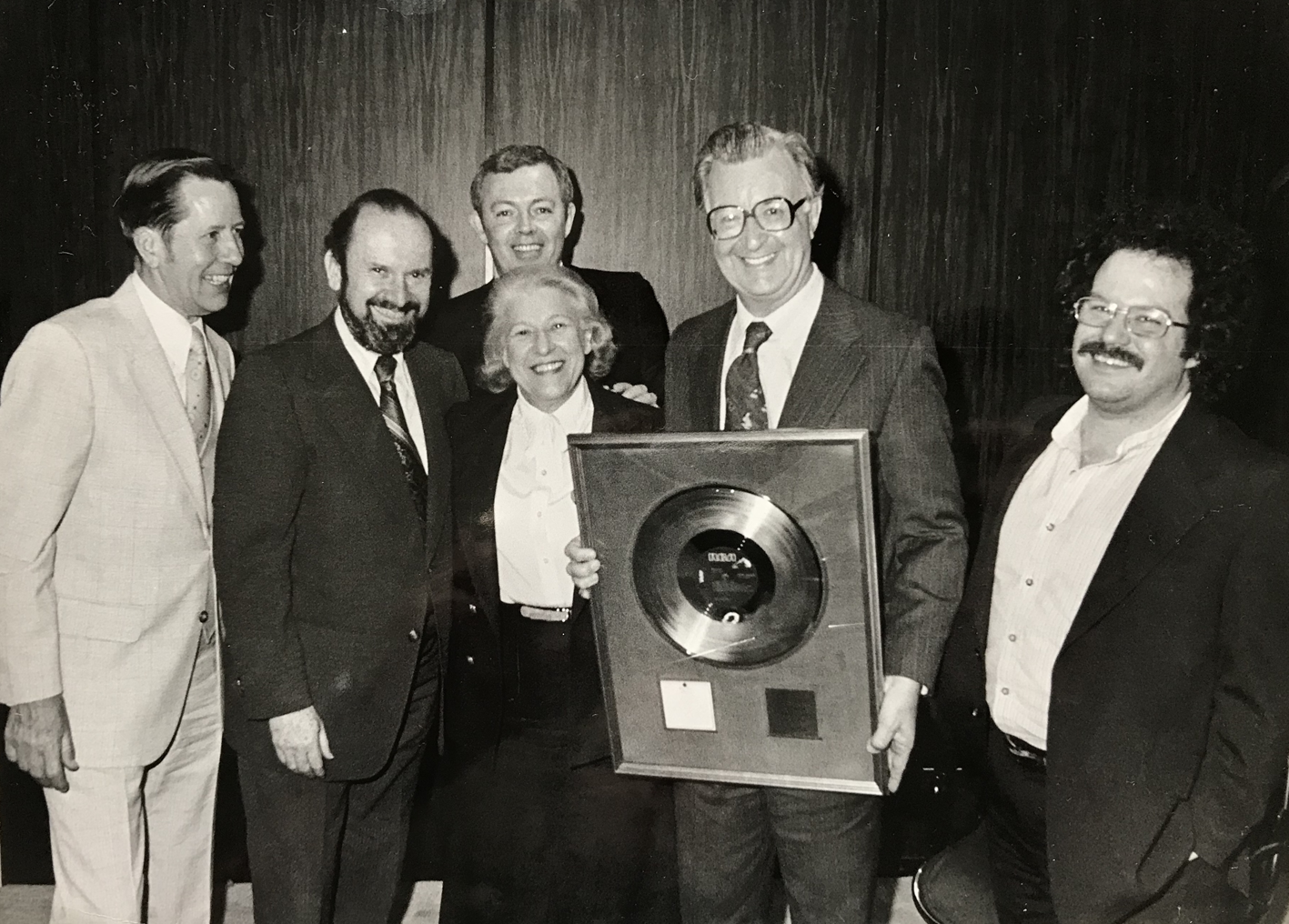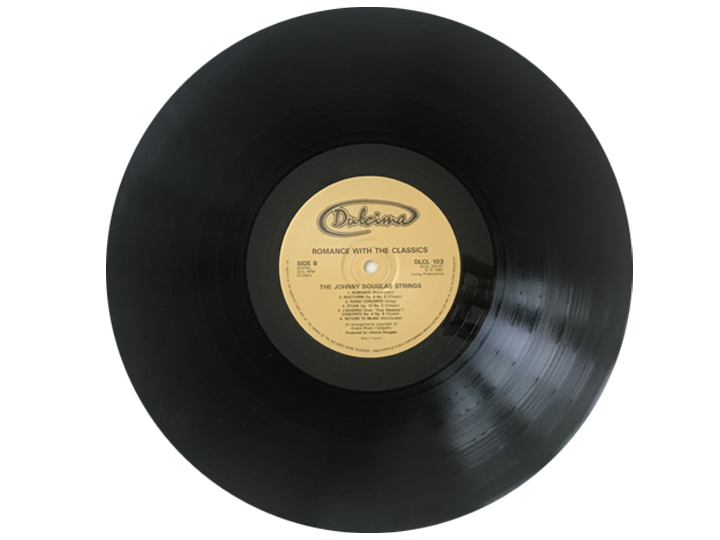Biography
(John Henry Douglas) 19.06.1920 – 20.04.2003

Johnny Douglas was a prolific Musical Director, Arranger, Composer, Broadcaster, Recording Artist & Film Music Composer. He was one of England’s masters of String arranging. He composed the music to the 1970 hit film ‘The Railway Children’, plus 37 other feature films. He recorded over 500 tracks for DECCA and over 80 albums for RCA. In the 1980’s he composed & conducted all the wall to wall music for the children’s TV animation series ‘Spiderman And His Amazing Friends’, ‘Dungeons & Dragons’, ‘Incredible Hulk’, ‘GI Joe’ & ‘Transformers’.
THE EARLY YEARS
Johnny Douglas was born in Hackney, London, England, on 19th June 1920, the eldest of two sons of John and May Douglas, two good, honest, working class people. The family moved to Bermondsey where his mother was a housewife and his father held a secretarial position until he became Alderman of West Bermondsey Council.
One of his earliest recollections was playing gramophone records on a machine that produced sound via a large green horn. By associating the music he heard with the colour and design of the labels on the 10” heavy and sometimes single sided records, he learned how to select the tune he wanted to hear. Music fascinated him above all else and he would often sit spellbound by the side of his uncle while he was playing the piano and the harmonium. At the tender age of 2½ years, his parents listened, not believing their own ears, when he played on the piano, one finger fashion, one of the popular tunes of the day that he had heard on one of his father’s records. He remembered playing “The Washington Post” that he learned from a record, which he felt sure was a green labelled Regal Zonophone.
Johnny went to school at the age of 3 years where he was soon asked to demonstrate his ability on the piano to the assembled teachers. At 3½ years he played a duet with the head teacher at a school concert – the piece, Rendezvous. He started piano lessons when he was 4 years old and gradually became interested in how music sounds were made. His music teacher discovered that he could name the notes with his back to the piano. This seemed not in the least extraordinary to him until she brought in all the occupants of the house to witness his “trick”. He then began to realise that he had performed something unusual.
He discovered the mysteries of arranging and orchestration at about 10 years old and it was then that he knew his destiny. From 11 years on, he gleaned knowledge of instruments and transpositions and, by studying printed band parts and listening to records, he slowly became aware of the art of composition integrated with orchestration. It was this creative ingredient that was the hardest part. He won a government scholarship to St. Olaves & St. Saviours, a grammar school in Tooley Street, Bermondsey and, at the age of 13 years, he formed a band, mainly of school friends, and this led to winning awards in dance band contests. He left school when he was 18 years old, continued with his band and began working as a clerk in an accounts office. He soon realised this was not for him and that he wanted to make music his career.
THE BEGINNING OF HIS PROFESSIONAL CAREER
He made his first professional appearance in 1939 as pianist with the Neville Hughes Sextet and soon afterwards was called up for war service in the Royal Air Force, serving on various aerodromes in Scotland and England. He formed his own R.A.F. dance band and when, later, an arm injury prevented him from playing the piano for about two years, he concentrated on his real love – arranging and composing. He won a Melody Maker Jazz Jamboree award for the best dance band composition.
POST WAR YEARS
After the war he sent a copy of one arrangement to all the bandleaders of the day. George Elrick replied and engaged him as staff arranger. He began arranging for many famous bands including Bert Ambrose, Ted Heath and Edmundo Ros then became pianist/arranger with the Cyril Stapleton Band and pianist with broadcasting outfits of all kinds. He gained much all-round experience playing at society balls, including playing for Her Majesty the Queen when she was a young princess. In 1948, to gain more experience, he joined a music publisher as staff arranger and there began to write for orchestras rather than dance bands.
JOHNNY DOUGLAS conducting LITA ROZA in a Recording Studio during 1953
THE 1950’s
He started scoring and conducting vocal backings for Decca in 1952 and his first hit was Tex Ritter’s High Noon, released on Capitol. During the next three years he recorded over 500 titles for Decca, backing many famous names including Al Martino, and was Musical Director on many hits.
Lita was most famously known for recording the very popular track ‘How much is that Doggie in the window’ which reached no.1 in the UK Singles charts in 1953 making Lita the first British woman to have a no 1 single in the UK Charts and was also the first song to have a question in the title to reach a no. 1 spot. Johnny Douglas was the musical director and conductor for this recording.

THE BEGINNING OF JOHNNY’S ASSOCIATION WITH RCA
He started broadcasting with his own orchestra but it was not until 1958 that his childhood dream, to conduct a huge orchestra, came true. He was asked to score “LIVING STRINGS PLAY MUSIC OF THE SEA” for RCA. It was recorded at the Kingsway Hall, London, with an orchestra of 61 musicians, an experience he was never to forget. This began his long association with RCA, New York, where it was his good fortune to work with A & R producer, Mrs Ethel Gabriel. During the next twenty-five years he scored and conducted 80 albums for RCA alone.
Johnny received a GOLD disc for the RCA Album entitled “FEELINGS” recorded in 1977. The picture shows him being presented with the disc by Mrs Ethel Gabriel, accompanied by RCA Dignitaries.
THE BEGINNING OF BROADCASTING
In 1955 he began broadcasting with the BBC, with his own programme entitled “IN THE STILL OF THE NIGHT”, and there have been countless broadcasts since. From 1960 onwards his work increased tremendously. He began composing and scoring for films, had his own programme, again on BBC radio, entitled “SWING SONG”, which ran for two years, and was arranging for TV shows for such international stars as Shirley Jones, Howard Keel, Dame Vera Lynn and Dame Shirley Bassey. He was also arranging for numerous other recording artists.
During the 70’s Johnny was a frequent contributor to BBC Radio 2 programmes such as “Open House”, “Top Tunes”, “After Seven”, “The Terry Wogan Show”, “The Tony Brandon Show”, “The Late Night Extra”, “Music To Midnight” and “Charlie Chester’s Sunday Soapbox”, either with his own orchestra or conducting one of the Radio orchestras. He can still be heard on BBC National and Local Radio. Tracks from his albums with THE JOHNNY DOUGLAS ORCHESTRA and THE JOHNNY DOUGLAS STRINGS are frequently played on the various easy listening programmes.

THE BIG SUCCESS STORIES
Johnny had to his credit over 100 albums and 36 feature films, the most well known of the latter being “THE RAILWAY CHILDREN”, for which he received a British Academy Film & TV Arts Nomination (BAFTA), and “DULCIMA”, for which he conducted the Royal Philharmonic Orchestra. He composed and arranged the music for the American TV children’s series “Spider-man and his Amazing Friends”, “Dungeons & Dragons”, and “The Incredible Hulk”. He was also composer of the incidental music and arranger of all the music for “The Transformers” and “G.I.Joe”. All the series have been shown on worldwide television.
THE BIRTH OF HIS OWN RECORD LABEL
In 1983 Johnny started his own record label – DULCIMA, producing top quality digitally recorded easy listening albums with different artists and with his own orchestra. At the end of 1999 he completed his first classical composition – a symphonic poem. It is a light classical work with three movements, entitled “The Conquest”. The work was recorded for the DULCIMA label and was highly acclaimed by musicians, colleagues and radio presenters. This encouraged him to write a sequel, another symphonic poem entitled “The Aftermath”, as well as a descriptive composition for solo flute entitled “The Blue Damsel-fly”. These compositions are available on an album of new classical works entitled “JOHNNY DOUGLAS IN CONCERT”, with the Dulcima Symphony Orchestra. Released on the DULCIMA label on compact disc only – DLCD 117.

The nineteenth Johnny Douglas release on the DULCIMA label is entitled “THE RAILWAY CHILDREN”. It is a 2-CD set, featuring Johnny Douglas and his Orchestra playing music from the motion picture and Lionel Jeffries narrating the story with extracts of dialogue and theme music from the film. Released on the DULCIMA label on compact disc only – DLCD 120.
In 2008 the Dulcima Label obtained the licience from Sony Music to release the Johnny Douglas albums from the RCA Living Strings Series. The first ablum to be released was ‘Where Did The Night Go’. This is two albums from the Living Strings Series originally recorded in the 1960’s by Johnny Douglas – ‘In the Still of the Night’ and ‘Where did the Night Go’. Both digitally re-mastered onto one CD. This is the first release in the Living Strings Collection on the Dulcima label.
The second in the Living Strings Collection, is ‘The Spirit of Christmas’. It is a digitally re-mastered 2-CD set comprising of The Living Strings Christmas Albums, ‘The Spirit of Christmas’, ‘White Christmas’ and ‘A Christmas Songbook’. The latest release on the Dulcima label, is On Broadway, two albums from the RCA Living Strings and Living Voices series ‘No, No, Nanette’ and ‘On Broadway’, digitally remastered onto one album.
The nineteenth Johnny Douglas release on the DULCIMA label is entitled “THE RAILWAY CHILDREN”. It is a 2-CD set, featuring Johnny Douglas and his Orchestra playing music from the motion picture and Lionel Jeffries narrating the story with extracts of dialogue and theme music from the film. Released on the DULCIMA label on compact disc only – DLCD 120.
In 2008 the Dulcima Label obtained the licience from Sony Music to release the Johnny Douglas albums from the RCA Living Strings Series. The first ablum to be released was ‘Where Did The Night Go’. This is two albums from the Living Strings Series originally recorded in the 1960’s by Johnny Douglas – ‘In the Still of the Night’ and ‘Where did the Night Go’. Both digitally re-mastered onto one CD. This is the first release in the Living Strings Collection on the Dulcima label.
The second in the Living Strings Collection, is ‘The Spirit of Christmas’. It is a digitally re-mastered 2-CD set comprising of The Living Strings Christmas Albums, ‘The Spirit of Christmas’, ‘White Christmas’ and ‘A Christmas Songbook’. The latest release on the Dulcima label, is On Broadway, two albums from the RCA Living Strings and Living Voices series ‘No, No, Nanette’ and ‘On Broadway’, digitally remastered onto one album.
JOHNNY DOUGLAS at the Piano
HIGHLIGHTS
Johnny felt that God had given him a wonderful gift and that he was a very fortunate man. His music meant the world to him and he appreciated it had given him a good life and opportunities to meet wonderful people and go to wonderful places. He considered one of his biggest achievements was conducting the Royal Philharmonic Orchestra for the film “DULCIMA”. He regretted that he had not composed for more films. He was very proud of his own record label, DULCIMA, and he was still contributing to the running of it until two days before he died.
Johnny had many amusing anecdotes and stories to tell. One occasion that most amused him was when he was asked on to the set of “The Railway Children” in Yorkshire to meet Dinah Sheridan. He was invited to a fish & chip supper party in one of the caravans. He was so taken with Dinah Sheridan that, not concentrating on his meal, he upset his supper on the floor, much to the amusement of the party and embarrassment to himself.
Johnny was a modest man and a true professional. He had a group of regular musicians that he could call upon for his recording sessions and went to great trouble to make sure a date was fixed to suit their availability. He knew then that the music he had written would be played, as he wanted it, with the minimum rehearsal.

19th June 1920 – 20th April 2003
Johnny Douglas passed away in the early evening of Easter Sunday, April 20th 2003, at his home in Bognor Regis in the arms of his devoted and loving wife, Marion. He died of prostate cancer. It had been in remission for over seven years but sadly recurred and in March he was told there was no more medical treatment he could have. He retained his sense of humour right to the end and, as he was during his life, even at the end he was an inspiration to all his family and friends. He was survived by his wife, Marion, two daughters (his son sadly died in 1988) and three grandchildren who all love and miss him dearly. His love, his music and his name will live on forever.
Marion passed away on 13th December 2019 and her Ashes were interned with her beloved Johnny.
UK ARTISTS
British artists for whom Johnny has worked include (alphabetically):
Moira Anderson, Dame Shirley Bassey, The Bachelors, John Boulter , June Bronhill, Dora Bryan, Max Bygraves, Stuart Gillies, Dulcie Gray, John Hanson, Dickie Henderson, Vince Hill, Frankie Howerd, Teddy Johnson, Denis Lotis, Dame Vera Lynn, Janie Marden, Alfred Marks, Kenneth McKellar, Lita Rosa, Mike Redway, Joan Regan, Malcolm Roberts, Patricia Routledge, Harry Secombe, Semprini, Ann Shelton, Jimmy Tarbuck, Bruce Trent, Dickie Valentine, Frankie Vaughan, David Whitfield, Rita Williams, Mark Wynter, Jimmy Young.
BANDS & ORCHESTRAS
Bands and Orchestras for whom Johnny has worked (alphabetically):
Bert Ambrose, Stanley Black, Frank Chacksfield, Billy Cotton, Ted Heath, Joe Loss, Ken Mackintosh, Mantovani, Jack Parnell, Lou Prager, Edmundo Ros, Cyril Stapleton, Eric Winstone.
ALL the BBC Radio orchestras.
USA ARTISTS
American artists for whom Johnny has worked (alphabetically):
Shirley Jones, Howard Keel, Al Martino, Barbra Streisand, Tex Ritter.
FILMS
Johnny composed, arranged and conducted for the following films:
The Touch of Death (1961), Day of the Triffids (1962), The Hi-Jackers (1963), Srictly for the Birds (1963), Mozambique 1965), Crack in the World (1965), Kid Rodeo (1966), Bikini Paradise (1967), Run Like a Thief (1968), Circus of Fear (1966), The Bay of Saint Michael (1963), The Guns of Casa Grande (1964), The Stalkers, Victim Five (1964).
21 films in the “Scales of Justice” series (1965-1967)
A piece of music featured in the film Risky Business (1983), starring Tom Cruise.
The Traitors (1963) – a Cannes Film Festival award winner.
The Railway Children (1970) – for which he was nominated for the Anthony Asquith Memorial Award by BAFTA for the music.
Dulcima (1971) – for which he conducted The Royal Philharmonic Orchestra.
Telstar (2008) – Signature music for the opening credits, composed by Johnny Douglas and played by the Packabeats.

TV PROGRAMMES
Johnny composed, arranged and conducted for the Children’s Television Programmes: –
Spiderman And His Amazing Friends (1981), The Incredible Hulk (1982), Dungeons & Dragons (1983), The Transformers (1984), G.I. Joe (1983), Pandamonium (1982) & My Little Pony (1984).
Check the Internet Movie Database for further information – IMDB

